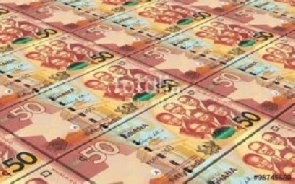The Ghana Cedi ended the first month of 2017 with a depreciation rate of 2.80 percent against the US dollar, according to investment bank, Frontline Capital Advisors.
Among six African currencies that were captured by thecapital advisors, the cedi, the Nigerian naira, Egyptian pound and Kenyan shilling all registered depreciations against the American dollar. They declined by 2.80 percent, 1.47 percent, 2.82 percent and 1.42 percent respectively.
The Mauritian rupee and Moroccan dirham however increased in value against the US dollar by 1.13 and 1.40 percent correspondingly.
Many analysts have expressed worry about the recent trend but are counting on the new Finance Minister and his team to craft a strategy that will support the Bank of Ghana’s quest to stop the disturbing trend.
According to MrKen Ofori Atta, government will use a number of fiscal policies and practical economic measures - such as increasing agricultural output to correct the imbalances between imports and exports of agriculture produce - to stabilise the cedi.
“With the cedi’s instability, there are a number of things we have to do and that is where the one factory, one district comes into the fore. We are now looking to see whether we can generate export and therefore diversify the economy,” he said.
Mr Ofori Atta has also disclosed government’s intention to reduce the importation of crude oil as the Sankofa Gas project comes on stream in the third quarter of this year. This will reduce the demand of forexfor crude oil importation.
Interestingly, the recent decline in Treasury bills yields and expected lower inflation rates could not boost the supply side of the dollar and consequently improve the cedi’s stability. The 91-day and 182-day bills are presently going for 15.92 percent and 16.96 percent respectively.
The central bank had also injected some millions of dollars into circulation but is yet to make an impact on the currency market.
Financial market portal ‘Doobia’ said “the cedi could still be under pressure against the US dollar in the first half of the year. May be we could see some stability in the second half of the year as we boost foreign exchange reserves from increased oil revenue and proceeds from COCOBOD syndication”.
Presently, the cedi is trading at about GH¢4.44 against the US dollar at the forex bureau. It is however unclear whether the depreciation will continue or subside.
It is expected that the local currency will continue this downward trend in the next few months before it stabilises.
Businesses will soon rush for more dollars to pay up for imports made on credit for the Christmas celebration. The rush is projected to be higher than what was recorded in the past few years because last year was an election year.
Business News of Thursday, 9 February 2017
Source: peacefmonline.com
Cedi ends January with 2.80% depreciation rate
Entertainment












